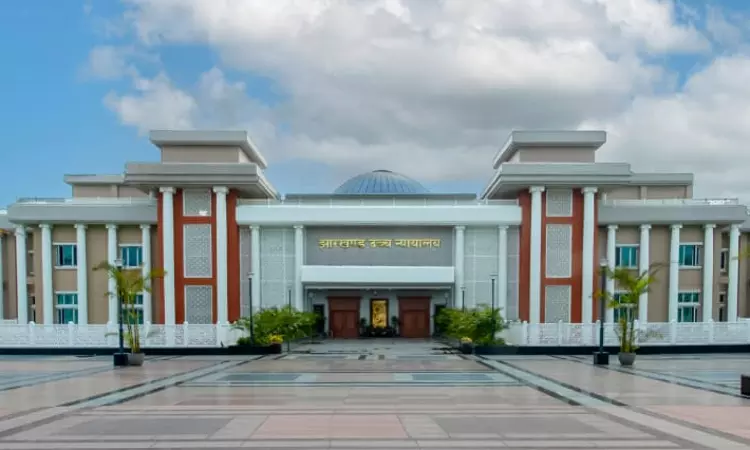- Home
- /
- High Courts
- /
- Jharkhand High Court
- /
- Jharkhand High Court Strikes Down...
Jharkhand High Court Strikes Down State Amendment To Registration Act Allowing Govt To Quash Any Registration On Ground Of Public Policy
Bhavya Singh
16 May 2025 11:45 AM IST
Referring to a 20-year old Supreme Court decision which struck down an amendment made by Rajasthan government to the Registration Act empowering the state to set aside any registration on the ground of public policy, the Jharkhand High Court struck down a similar provision introduced by erstwhile Bihar government. The high court was considering a plea challenging vires of the Section 22-A of...
Referring to a 20-year old Supreme Court decision which struck down an amendment made by Rajasthan government to the Registration Act empowering the state to set aside any registration on the ground of public policy, the Jharkhand High Court struck down a similar provision introduced by erstwhile Bihar government.
The high court was considering a plea challenging vires of the Section 22-A of the Registration Act introduced by Bihar government through the 'Bihar Amendment 6 of 1991' which was subsequently adopted by Jharkhand government and the consequential 2015 notification.
For context Section 22-A pertains to registration of documents which is against the public policy. It states that "State Government may, by notification in the official gazette, declare that the registration of any document or class of documents is against the public policy".
A division bench of Chief Justice M.S. Ramachandra Rao and Justice Rajesh Shankar in its order referred to Supreme Court's 2005 decision in State of Rajasthan and Others vs. Basant Nahata where a similar amendment made in the State of Rajasthan was considered by the apex court. The high court observed that the Supreme Court had held that the doctrine of “public policy” is vague and uncertain and there are no guidelines to interpret the same.
It had held that it is not possible to define “public policy” with precision at any point of time and it is not for the Executive to fill the grey areas as the said power vests in the judiciary. It held that whenever interpretation of concept “public policy” is required to be considered, it is for the judiciary to do so and in doing so, even the power of the judiciary is very limited. It held that what is essentially within the exclusive domain of the judiciary cannot be delegated to the Executive unless the policy behind the same is finally laid down. The apex court had rejected Rajasthan government's plea where it had contended that the State, being higher authority, having been delegated with the power of making declaration in terms of Section 22-A of the Act, would not abuse and held that the provision of Section 22-A is ultra vires Article 14 and Article 246 of the Constitution of India.
The Supreme Court had also rejected Rajasthan government's plea that it being a policy decision, Court ought not to interfere. It had held that a legislative policy must conform to the provisions of the constitutional mandates and that even otherwise, such a policy decision is subject to judicial review.
The high court thereafter said:
“Having regard to the said decision of the Supreme Court, which is binding on this Court, and since the provision considered by the Supreme Court in the said judgment is identical to the provision framed by the Bihar State, which is adopted by the State of Jharkhand, Section 22-A of the Registration Act, 1908 as amended by the Bihar Amendment Act 6 of 1991 and as adopted by the State of Jharkhand, as well as the consequential Notification issued under the said provision on 26.08.2015 are struck down and all orders passed by the Sub Registrars or the officials of the Registration Department pursuant to the notification 26.08.2015 shall stand set aside.”
The above ruling came in a writ petition filed by the Chotanagpur Diocesan Trust Association (CNDTA), represented by Rt. Rev. B. B. Baskey, the Bishop of Chotanagpur, and Rev. Arun Barwa, along with other connected petitions whereby the petitioners had challenged the constitutional validity of Section 22-A of the Registration Act, 1908, as introduced by the State of Bihar vide the Bihar Amendment 6 of 1991 which was also been adopted by the State of Jharkhand, and the consequential notification issued thereunder being notification No.1132 dated 26.08.2015.
Following the binding precedent of the Supreme Court, the Jharkhand High Court concluded that the provision as amended by Bihar and adopted by Jharkhand, along with the notification issued under it, was unconstitutional.
Accordingly, all orders passed by Sub-Registrars or officials of the Registration Department pursuant to the 2015 notification were set aside. The high court allowed the writ petitions to the extent of this relief, while other issues raised by the petitioners were expressly left open by the court.
Case Title: Chotanagpur Diocesan Trust Association (CNDTA) and others v. State of Jharkhand and others
Case No: W.P.(C) No. 5088 of 2018 (with connected cases)



